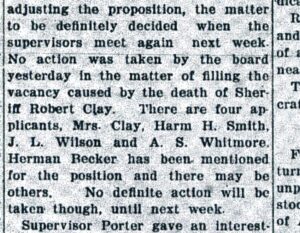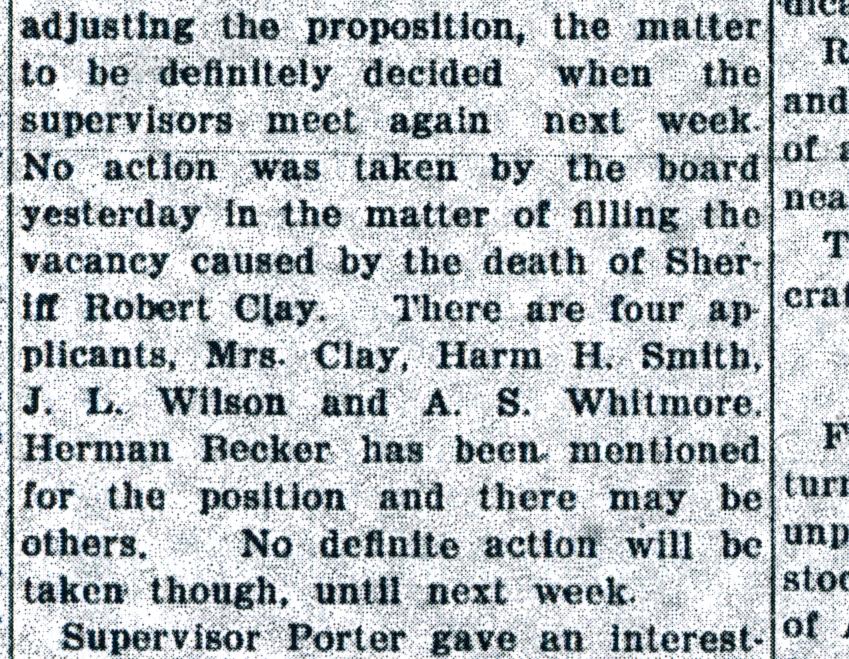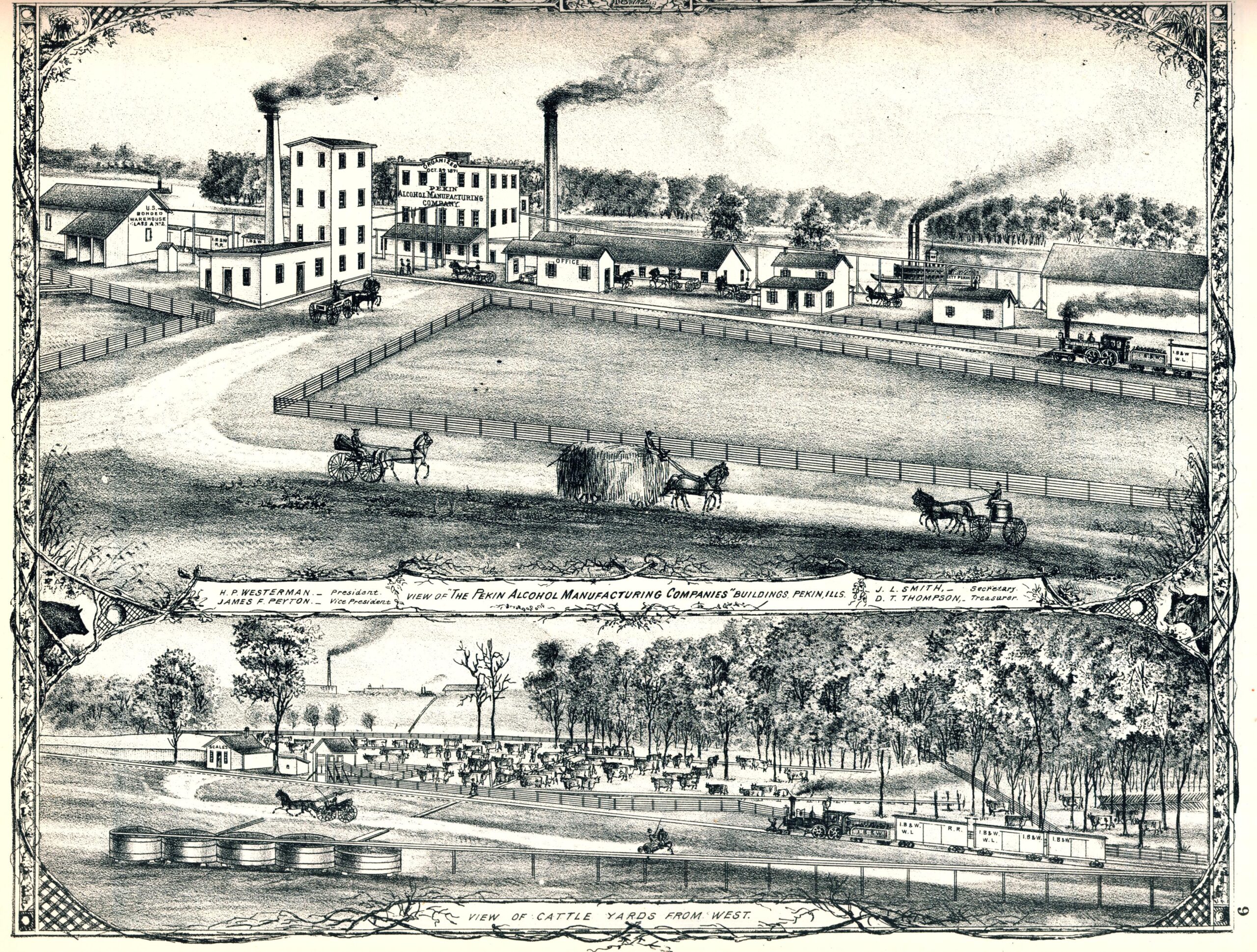A few weeks ago, this column recalled the death of Tazewell County Sheriff Robert Ingersoll Clay, who died Sept. 4, 1920, from complications of a gunshot wound to his knee that he suffered in a Sept. 2 gun fight with liquor bandits near Wesley City (Creve Coeur). Clay is notable in local history as one of three members of the Tazewell County Sheriff’s Office to die from injuries received in the line of duty, and is the only Tazewell County Sheriff to die in office from such injuries.
Clay’s death was the occasion of a great outpouring of grief on the part of the community and sympathy for his family. It also raised the practical question of who would be chosen to serve out the remainder of Clay’s term. Somewhat remarkably for that time, community sentiment strongly was in favor of naming Clay’s widow, Mrs. Louie A. (Miller) Clay (1871-1954), to serve out the remaining months of his term.
Prior to naming Clay’s replacement, however, state law already provided for a “line of succession” to determine an interim sheriff – when a sheriff dies or becomes incapacitates, the county coroner automatically becomes interim sheriff. The Pekin Daily Times on Sept. 6, 1920, reported on the initial provisions for succession in the sheriff’s office as follows:
“With the death of Sheriff Robert Clay, Coroner L. R. Clary becomes the sheriff of Tazewell county and he has assumed charge of the duties of the office. The same deputies sreving (sic) under Sheriff Clay will continue in office, under the coroner and no change will be made in the conduct of affairs of the office until a successor has been appointed by the board of supervisors which convene September 14.
“The appointee of he (sic) board will serve until a successor to the sheriff has been elected, this election to take place this fall. The suggestion that Mrs. Claybe (sic) named to fill out the unexpired term of her deceased husband has met with universal favor.”
Though the proposal that Mrs. Clay be appointed sheriff was unusual, the people in the county felt strong sympathy for her as the widow of a well-loved sheriff, as can be seen in various articles and columns in the Pekin Daily Times that month. Along with letters of tribute and sympathy, the newspaper also reported on the establishment of a “testimonial fund” or memorial foundation to aid Mrs. Clay and her family.
Another thing working in favor of the proposal to name Mrs. Clay sheriff were some significant changes then under way in societal attitudes and laws regarding appropriate public roles for women. It was less than a month before Sheriff Clay’s death, on Aug. 18, 1920, that the 19th Amendment granting women the right to vote was ratified. On Sept. 8, right next to a prominent report on the establishment of the “Bob Clay Testimonial Fund,” the Pekin Daily Times ran a story under the headline, “FIRST WOMEN JURORS IN THE COUNTY COURT,” telling of the first women’s names to be drawn from the Tazewell County rolls of registered voters.
“This morning in the county court, the first jury composed partly of women, to be called in this county, reported to Judge Schaefer. Those called to serve were Anna Hall, Ida Cooper, Belle Kunce, Emma Richmond, Ida Smith, Belle Smallwood, James Coggins, Frank Reise, W. H. Woost, Edward Conaghan, J. H. Shade and W. G. Fair.”
Those societal changes perhaps helped make the idea of a woman sheriff conceivable to many people in a county that had already seen women post masters in the 1800s and even – as this column recalled in March this year – a female sheriff’s deputy appointed in 1916. And after all, state law has never restricted the office of county sheriff to members of the male sex.
Indeed, one need not even have any law enforcement training or experience to hold the office of sheriff, though that is naturally to be preferred. And by the time the county board met on Sept. 14 to consider Clay’s successor, a few candidates with law enforcement experience had put their names forward in addition to Mrs. Clay, whose experience with the sheriff’s department stemmed from her job as matron of the Tazewell County Jail. With additional candidates to consider, the county board decided not to take immediate action on the question of the sheriff’s successor, as the Pekin Daily Times reported on Sept. 15, 1920:
“No action was taken by the board yesterday in the matter of filling the vacancy caused by the death of Sheriff Robert Clay. There are four applicants, Mrs. Clay, Harm H. Smith, J. L. Wilson and A. S. Whitmore. Herman Becker has been mentioned for the position and there may be others. No definite action will be taken though, until next week.”

Each of the four men worked in law enforcement, and in particular, Whitmore and Becker were two of Clay’s deputies. When the county board met again on Sept. 20, the majority of the board members decided against naming Mrs. Clay to complete her late husband’s term. One board member proposed at least granting her the salary her husband would have received, but that proposal was tabled and instead the board decided that Mrs. Clay would continue as jail matron. The Daily Times reported as follows on Sept. 21:
“The appointment by the board of A. S. Whitmore to fill out the unexpired term of the late Sheriff Robert Clay, met with general approval and it is the prevailing opinion that the supervisors acted wisely in their selection. Sheriff Whitmore will not asume (sic) the duties of his office until he has received his commission from the state and his bond had been approved by the supervisors.
“It is understood that there will be little change in the present efficient force of deputies connected with the sheriff’s office. Herman Becker will probably remain as office deputy and one deputy will be name to fill the vacancy made by the appointment of Whitmore. Under the arrangement as made by the board of supervisors, Mrs. Clay is to be retained as matron at the jail. She will have charge of feeding of prisoners and the use of the residence, with the exception of two rooms which are to be set aside for the use of a deputy who is to remain at the jail at nights. Mrs. Clay is to be allowed $100 per month and her living expenses by the board. . . .
“. . . but one ballot was taken on the appointment of sheriff. Whitmore received 14, E. O. Neef 5, and Herman Becker, Chas. R. Towne and H. L. Cales 1 each. A resolution which had been offered by Supervisor H. F. Johns of Pekin, to pay Mrs. Clay the salary which her husband, Robert Clay, would have earned had he survived the full term, was tabled on motion of Supervisor Wadsworth.”











